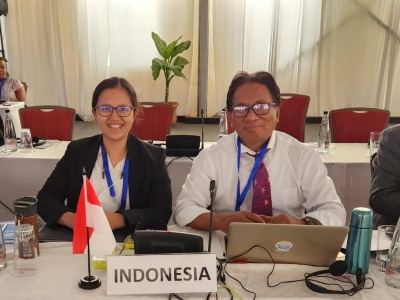Discussing Rumpon Drifting, Prof Indra Jaya Attends a Special Session of the IOTC in Kenya

Prof Indra Jaya, Professor of the Faculty of Fisheries and Marine Sciences (FPIK) IPB University who currently serves as Chair of the Compliance Commission of the Indian Ocean Tuna Commission (IOTC) discussed drifting FADs in a Special Session of the IOTC in Kenya, some time ago.
“Special sessions, as the name suggests, are meetings with urgent topics to be resolved. The aim of the agenda this time is to establish conservation and management measures for FADs, this is related to drifting FADs operated in the Indian Ocean,” said Prof Indra.
As is known, he continued, FADs have been widely used for fishing activities, and are currently widely used in catching tropical tuna using purse seines. FADs also account for nearly 35 percent of tropical tuna catches and 45 percent of skipjack tuna catches in the Indian Ocean.
“Unfortunately, the use of FADs in fishing activities is currently under the spotlight due to a significant increase in numbers and technological developments. As well as the possibility of adverse effects that this trend might have on the dynamics of fish stocks and ocean ecosystems,” he explained.
In fact, he added, tropical tuna catches continued to increase with the status of yellowfin tuna and bigeye tuna classified as overfishing. In addition, the use of drift FADs has an ecological impact in the Indian Ocean, one of which is the capture of juvenile tuna, the catch of bycatch species, and pollution of drift FADs which are not biodegradable.
“So this is a deep concern to immediately find a solution with what it looks like,” he explained. Furthermore, on the Consideration of Management Measures agenda, a team chaired by Indonesia and consisting of Bangladesh, India, Pakistan, Madagascar, Malaysia, Maldives, Mozambique, Somalia, South Africa, and Sri Lanka presented a proposal regarding the management strategy of drifting FADs entitled On Management of Drifting Fish Aggregating Devices (DFADs) in the IOTC Area of Competence.
There are several proposed solutions and concessions related to the management of drifting FADs in the Indian Ocean, including eliminating ambiguity and improving management, increasing transparency, and reducing the impact on rare, endangered and protected species and biodiversity.
Prof Indra hopes that by ratifying the 6th IOTC special session report it will be able to be implemented effectively to ensure the sustainability of the purse seine tropical tuna fishery and its related marine ecosystems. (RAT/Zul) (IAAS/MFR)



